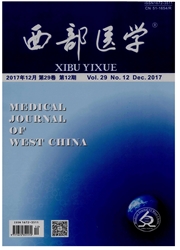

 中文摘要:
中文摘要:
目的 分析负性情绪对中晚期肺癌患者氩氦刀术后生活质量的影响.方法 153例肺癌患者为病例组,同期健康体检者100例为健康对照组,两组均进行负性情绪、生活质量调查,采用Spearman相关分析和多因素Logistic回归分析负性情绪对患者生活质量的影响.结果 健康对照组焦虑自评量表(SAS)、抑郁自评量表(SDS)评分为(27.6±8.3)分、(32.6±7.1)分,均低于病例组,两组比较差异有统计学意义(P<0.05);病例组整体生活质量评分为(57.22±11.25)分,处于较差水平;患者抑郁、焦虑评分与整体生活质量、功能维度呈显著负相关(P<0.05),与症状维度呈显著正相关(P<0.05);多因素Logistic回归分析显示焦虑、抑郁对肺癌患者生活质量有显著影响(P<0.05).结论 负性情绪对中晚期肺癌患者氩氦刀术后生活质量有显著影响,要及时采取干预措施减轻负性情绪,以改善和提高患者术后生活质量.
 英文摘要:
英文摘要:
Objective To investigate effect of negative emotion on advanced lung cancer patients quality of life after argon helium knife. Methods ]53 patients with advanced lung cancer were the case group, while another 100 cases which accepted physical examination as the healthy control group. Both groups all accepted negative emotions and quality of life investigation. Spearman correlation analysis and multivariate Logistic regression analysis were used to find the effect of negative emotions on the quality of lung cancer patients. Results SAS (27.6 ± 8.3)% and SDS (32.6 ± 7.1 ) of the healthy control group were higher than that of the case group (P〈0.05). The overall quality of life in patients score (57.22±11.25) was in a poor level. The patients with depression, anxiety and overall the quality of life were negatively correlated with the functional dimension (P〈0.05) and significantly correlated with symptom dimensions (P〈0.05). The anxiety and depression had a significant impact on the quality of life in patients with lung cancer (P〈0.05). Conclusion Negative emotions on advanced lung cancer patients quality of life after argon helium knife has a significant impacf. Timely intervention measures can reduce the negative emotions and improve the quality of life of patients after operation.
 同期刊论文项目
同期刊论文项目
 同项目期刊论文
同项目期刊论文
 期刊信息
期刊信息
